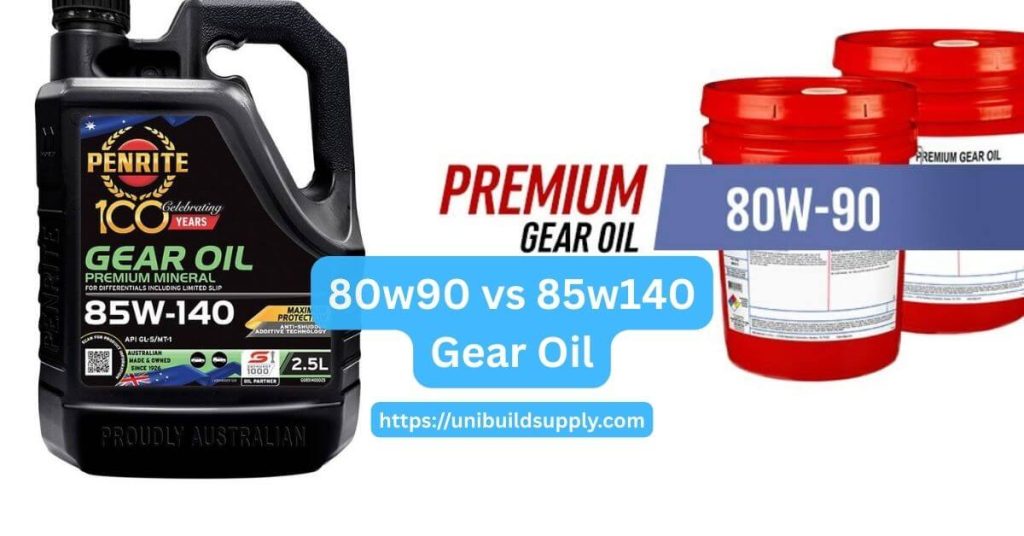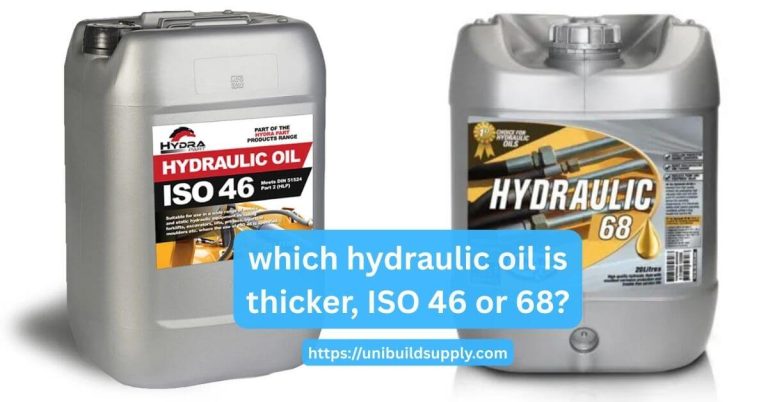80w90 vs 85w140 Gear Oil: Which One Is Right for Your Vehicle?
Meta description: Not sure whether to use 80w90 or 85w140 gear oil? This clear, expert guide compares viscosity, real-world uses, pros and cons, and synthetic vs conventional options—plus FAQs—to help you choose the right differential or manual transmission oil.
Gear oil protects the gears, bearings, and shafts in your differential, manual transmission, and (on some models) transfer case. The right oil reduces wear, keeps things quiet, and can even help fuel economy. Two common choices are 80w90 and 85w140. They sound similar, but they behave differently under load and temperature. Here’s how to pick the right one for your vehicle and driving conditions.

Gear Oil Viscosity Ratings
Gear oil grades follow the SAE (Society of Automotive Engineers) system.
- The first number with a “W” (e.g., 80W or 85W) describes cold-weather performance. Lower numbers flow better in the cold.
- The second number (e.g., 90 or 140) indicates viscosity at high operating temperature. Higher numbers stay thicker when hot.
In short:
- 80w90 is easier-flowing when cold and medium-thick when hot.
- 85w140 is slightly thicker when cold and much thicker when hot.
Helpful note:
- Many differentials require API GL-5 gear oil (for hypoid gears and heavy loads). Some manual transmissions specify GL-4 (kinder to yellow metals in synchronizers). Always match both the viscosity and the GL rating in your owner’s manual.
80w90 Gear Oil: Properties and Uses
80w90 is a versatile, everyday gear oil that balances protection and efficiency.
Key traits:
- Flows well in cold weather for quicker lubrication at startup
- Adequate film strength for normal driving and moderate loads
- Often more fuel-efficient than heavier oils
- Commonly specified in many differentials and some manual transmissions (check GL-4 vs GL-5)
Typical use cases:
- Passenger cars, crossovers, and light-duty pickups
- Commuting, highway driving, and mixed city use
- Moderate climates with seasonal changes
85w140 Gear Oil: Properties and Uses
85w140 is a heavy-duty oil built for high heat and high load.
Key traits:
- Thick, durable oil film that resists thinning at high temperatures
- Excellent protection under extreme pressure and heavy loads
- May reduce fuel economy slightly due to higher drag
- Can feel sluggish in very cold weather
Typical use cases:
- Heavy-duty trucks, vans, and work vehicles
- Frequent towing or hauling
- Off-road use and long climbs
- Hot climates and sustained high-load operation
Key Differences Between 80w90 and 85w140
| Feature | 80w90 | 85w140 |
|---|---|---|
| Cold flow | Better cold-start flow | Thicker in the cold |
| High-temp viscosity | Medium | Much thicker under heat |
| Load handling | Good for normal use | Best for heavy loads and extreme pressure |
| Fuel economy | Generally better | Slightly worse |
| Shifting feel (manuals) | Typically smoother | Can feel heavy; may affect synchronizers if not specified |
| Best suited for | Daily driving, moderate climates | Towing, off-road, hot climates |
| Common spec note | Often GL-4 or GL-5 depending on unit | Usually GL-5 for differentials |
When to Use 80w90 vs 85w140
Use 80w90 if:
- Your owner’s manual specifies it
- You drive a car, SUV, or light truck under normal conditions
- You live in a region with cold winters or mixed seasons
- You want slightly better fuel economy
- You rarely tow or haul heavy loads
Use 85w140 if:
- Your owner’s manual calls for it, especially in differentials
- You frequently tow, haul, or off-road
- You operate in consistently hot weather or under sustained heavy loads
- You’re addressing gear noise or heat when using a lighter oil
Important:
- Some modern trucks specify 75W-90 or 75W-140 synthetic. If that’s the case, use the specified grade rather than 80w90 or 85w140.
- If you have a limited-slip differential (LSD), you may need a friction modifier or an oil labeled “compatible with LSD.”
Performance Impacts of Choosing the Right Gear Oil
- Wear protection: Correct viscosity builds a protective film, reducing metal-to-metal contact.
- Noise and smoothness: Proper oil can quiet gear whine and smooth operation.
- Fuel economy: Thinner oils reduce churning losses; heavier oils increase drag.
- Heat control: Heavier grades maintain thickness at high temperatures to protect under extreme conditions.
- Cold-start behavior: Lower “W” grades flow faster in winter, preventing dry starts.
- Load capacity: Heavier oils improve protection when towing or climbing.
Pros and Cons of 80w90 and 85w140
80w90 Pros:
- Better cold flow and fuel economy
- Versatile for everyday driving
- Often lower cost and widely available
80w90 Cons:
- Less ideal for heavy towing or extreme heat
- May not quiet gear noise under severe loads
85w140 Pros:
- Strong protection under heavy load and high heat
- Good at reducing noise in hard-use scenarios
- Can extend service life in severe-duty applications
85w140 Cons:
- Slightly worse fuel economy
- Slower flow in very cold weather
- Overkill for many daily drivers
Synthetic vs Conventional Options
Both 80w90 and 85w140 come in conventional and synthetic versions.
| Attribute | Synthetic Gear Oil | Conventional Gear Oil |
|---|---|---|
| Cold-weather flow | Better | Adequate |
| High-temp stability | Better; resists oxidation | Good, but breaks down faster under heat |
| Potential drain intervals | Longer (follow OEM guidance) | Standard intervals |
| Cost | Higher | Lower |
| Best for | Extreme temps, towing, extended service | Normal commuting, regular service intervals |
Notes:
- Synthetic gear oil is compatible in most systems that specify the same grade and GL rating.
- Always confirm whether your differential needs a limited-slip friction modifier.
- Mixing brands or viscosities isn’t ideal; in an emergency top-up, schedule a full change soon.
Conclusion
For most passenger cars and light-duty trucks, 80w90 offers the right balance of protection, efficiency, and cold-weather performance. If you tow, haul, off-road, or drive in high heat, 85w140 delivers the thicker film you need to protect gears under stress. The most important rule: match what your owner’s manual specifies—both the viscosity grade and the GL rating. Doing so protects components, maintains performance, and helps you avoid costly repairs.
FAQs
What does 80w90 vs 85w140 mean?
These are SAE viscosity grades. The number before “W” rates cold-flow performance; the number after rates hot viscosity. 85w140 is thicker than 80w90 at operating temperature.
Can I use 85w140 instead of 80w90?
Only if your owner’s manual allows it. Heavier oil can hurt fuel economy and cold shifting and may not be suitable for transmissions with synchronizers.
Is 85w140 always better for towing?
It often is, but the best choice is whatever your OEM specifies. Many modern trucks actually specify 75W-140 synthetic rather than 85w140.
What is GL-4 vs GL-5?
They are API performance categories. GL-5 is common in differentials with hypoid gears. Some manual transmissions require GL-4 to protect yellow-metal synchros. Always follow the specified GL rating.
Do I need a limited-slip additive?
If you have a limited-slip differential and your gear oil isn’t already formulated for LSDs, you’ll need a friction modifier to prevent chatter.
How often should I change gear oil?
Typical intervals range from 30,000 to 60,000 miles, but severe use (towing, off-road, high heat) may require more frequent changes. Follow your owner’s manual.
Can I mix 80w90 and 85w140?
It’s not recommended. If you must top up in a pinch, plan a full drain and refill with the correct oil soon.
Can I use gear oil in my transfer case?
Only if specified. Many transfer cases use ATF or specialized fluids. Check the manual—using the wrong fluid can cause damage.
What are signs I’m using the wrong gear oil?
Persistent gear whine, overheating, stiff shifting (manuals), limited-slip chatter, or metal flakes on the drain plug are red flags.
Is synthetic gear oil worth it?
If you tow, drive in extreme temperatures, or want longer service intervals, synthetic can be a smart upgrade. For normal use, conventional oil that meets spec works well.
Resources
- https://bobistheoilguy.com/forums/threads/80w-90-vs-85w-140.351900/
- https://www.oilburners.net/threads/80w-90-or-85w-140-which-and-why.81343/
Keywords: gear oil comparison, 80w90 vs 85w140, what gear oil to use, differential oil guide, transmission fluid viscosity, best gear oil for towing, gear oil for cold weather, synthetic vs conventional gear oil, SAE gear oil ratings, heavy duty gear oil

